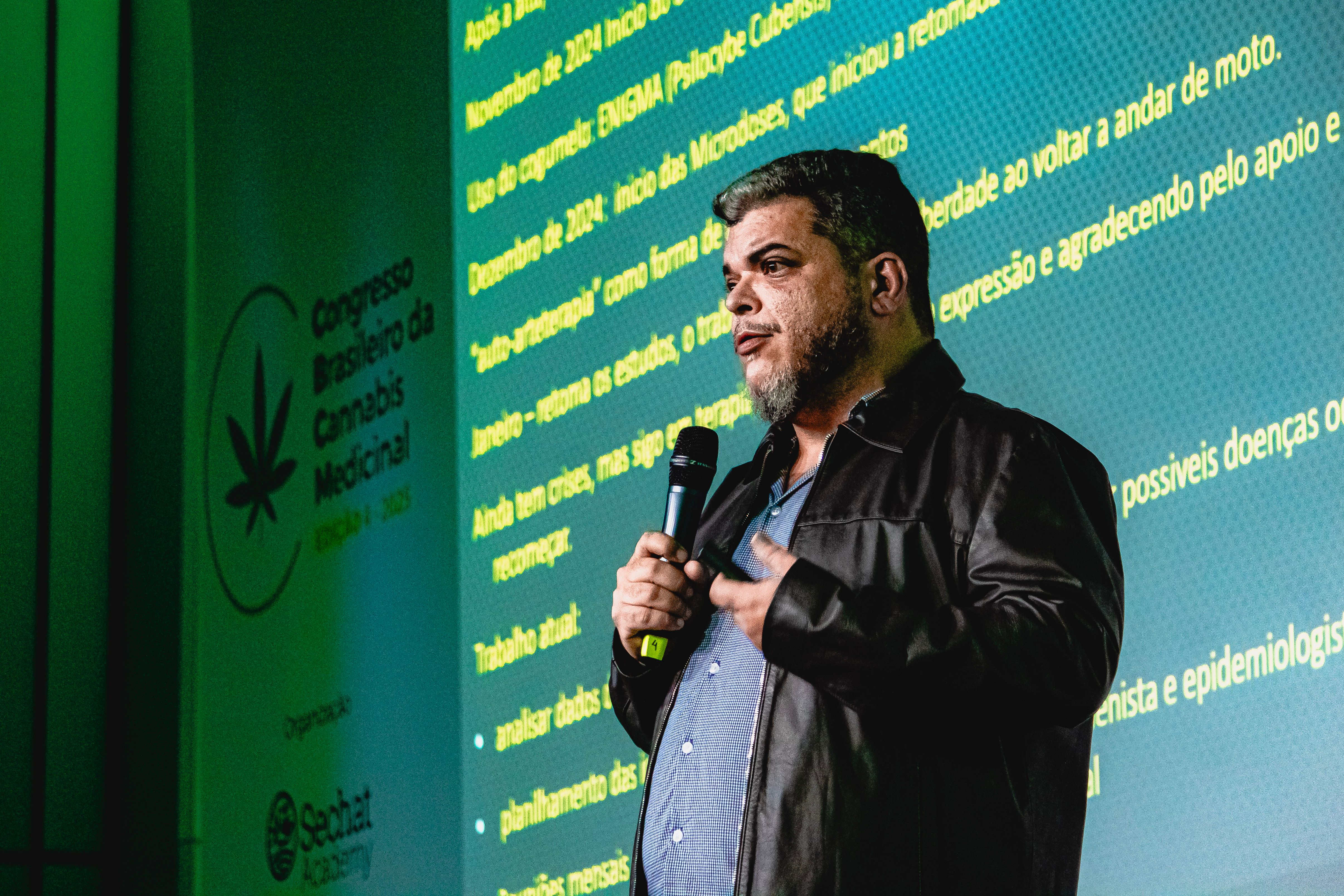Medo de avião, aranha ou cobra? Descubra como a cannabis pode aliviar a fobia
Estudos apontam que CBD e THC podem ajudar na extinção de memórias traumáticas. Especialistas, como o psicólogo Lauro Pontes, explicam os efeitos e desafios do uso da cannabis no tratamento do medo e do TEPT
Publicada em 25/09/2025

A ciência do esquecimento: cannabis e novas respostas para o medo | CanvaPro
Medo de avião, de aranha, de cobra ou até uma crise de pânico, ou de ficar sozinha em casa ou presa no elevador… Enfim, são muitos os tipos de medo ou fobias existentes. O problema é quando ele, o medo, deixa de ser reação e passa a ser prisão. Neste caso, buscar caminhos de alívio, como a cannabis medicinal, se torna urgente.
Pesquisas recentes sugerem que canabidiol (CBD) e tetrahidrocanabinol (THC), princípios da cannabis medicinal, têm potencial para ajudar no tratamento de fobias e traumas, modulando memórias de medo e possibilitando uma nova abordagem para transtornos que roubam a paz de quem vive com eles.
Caminhos para enfrentar o medo
As fobias vão muito além do nervosismo comum. Elas podem desencadear comportamentos de evitamento que chegam a paralisar a vida cotidiana. Um estudo da Universidade de Michigan (2013) demonstrou que o uso sintético de THC (dronabinol) ajudou participantes humanos em paradigmas de extinção do medo, reduzindo reações ao longo do tempo.
Essas evidências abrem espaço para reflexões importantes no contexto brasileiro. No campo dos tratamentos complementares, psicólogos e psiquiatras enxergam os compostos canabinoides como ferramentas promissoras para casos de fobia ou TEPT, especialmente quando as terapias convencionais como psicoterapia, antidepressivos ou ansiolíticos, não são suficientes ou geram efeitos colaterais significativos.
Saiba Mais
Cannabis, ansiedade e suas relações complexas
No entanto, ainda existem desafios regulatórios e de segurança: enquanto a Anvisa já permite o uso medicinal do CBD, o THC segue com restrições mais rígidas. Por isso, é fundamental estabelecer protocolos claros de dose, identificar perfis de pacientes e acompanhar eventuais efeitos adversos.
CBD e THC: aliados no desafio de apagar memórias do medo
Mais do que medicamentos, o cuidado com pacientes que convivem com traumas também passa pela psicologia. Embora psicólogos não prescrevam substâncias, eles podem caminhar lado a lado com os pacientes, ajudando a lidar com o medo, apoiando durante terapias de exposição e trabalhando junto a médicos para que o tratamento seja integral e humanizado.

O psicólogo Lauro Pontes, doutor em Psicologia e especialista em cannabis terapêutica, explica que o canabidiol (CBD) tem papel fundamental nesse processo. “O CBD facilita a extinção de memória porque atua nas vias pré-frontais límbicas, promovendo neuroplasticidade e regulando neurotransmissores envolvidos no processamento do trauma. Ele também modula receptores serotoninérgicos, como o 5-HT1A, o que ajuda a regular a ansiedade”, detalha.
Pontes destaca também o papel que o THC desempenha na extinção de memórias traumáticas e como ele pode atuar diretamente nos receptores CB1 do hipocampo e da amígdala cerebral, ajudando a reduzir o impacto dessas memórias. "Em doses baixas, pode ser muito eficaz. Brinco que seria interessante ter um spray nasal de 5 mg de THC nas ambulâncias do SAMU, para ser aplicado em pacientes estabilizados logo após o trauma, pois isso poderia diminuir o impacto da memória do medo desde o início”, pontua.
Apesar do entusiasmo, ele reforça a importância da cautela: “O desafio está na dosagem: o THC tem efeito bifásico, pode ser ansiolítico ou ansiogênico dependendo da dose. Por isso, o ideal é o uso bem controlado e em associação com o CBD. Em resumo: o CBD tem grande função nesse processo, mas o grande diferencial para a extinção de memórias traumáticas vem do THC, quando bem dosado”.
Caminhos para tornar o tratamento acessível, seguro e consciente
O futuro desse campo passa por incentivar ensaios clínicos no Brasil que testem o uso de THC e CBD em pessoas com diferentes tipos e intensidades de fobia, avaliando a segurança e a eficácia dos compostos em associação a terapias de exposição. Atualmente, já existem estudos brasileiros avaliando o CBD em pacientes com transtorno de ansiedade social, mostrando interesse crescente da ciência nacional nesse tema.
No horizonte das políticas públicas, o desafio é garantir acesso seguro e igualitário aos tratamentos já aprovados. Em São Paulo, por exemplo, a rede pública de saúde ampliou recentemente o fornecimento de canabidiol, respondendo à demanda crescente: em 2024, cerca de 672 mil brasileiros estavam em tratamento com cannabis medicinal. Mesmo assim, obstáculos como custos elevados e burocracia ainda dificultam que todos tenham acesso.
Por isso, é indispensável oferecer informação clara, empática e acessível às pessoas que vivem com fobia ou trauma, para que decisões sobre o tratamento sejam conscientes, integradas à psicologia clínica e sempre alinhadas a seus objetivos, riscos e limites.











